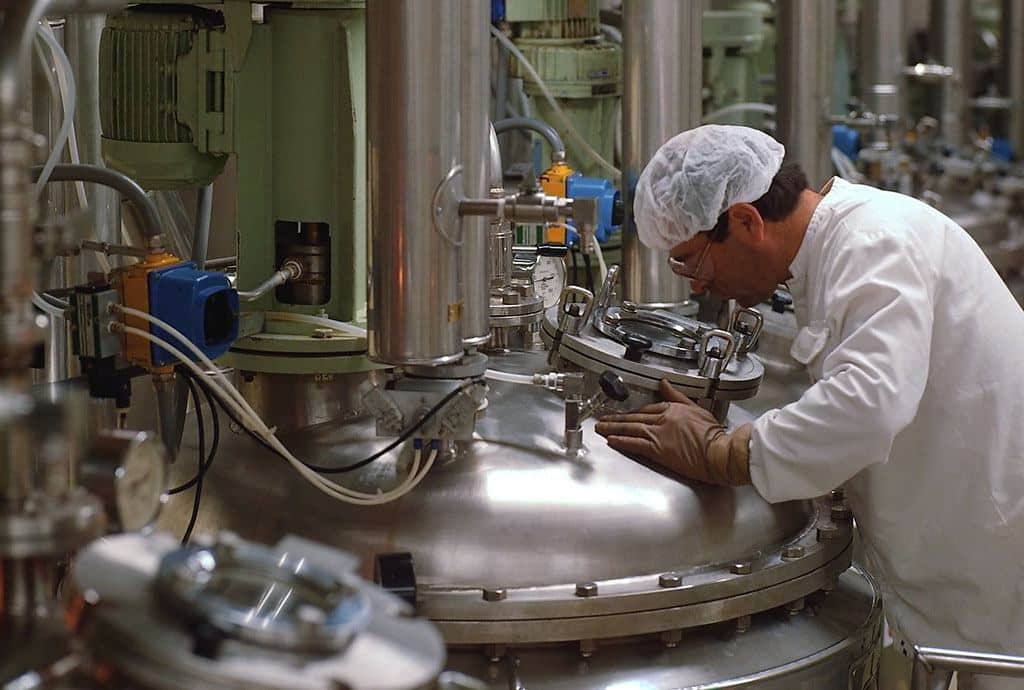Image: Ingersoll Rand
Quality Engineers work to ensure the overall quality of manufactured products. They test processes, monitor quality standards, create documentation, devise quality tests and define the criteria a test result should meet. Quality Engineers monitor the quality of a process and play a key role in fixing issues when they arise.
Some Companies might call this role:
- QA Engineer
- QC Engineer
- Senior Quality Specialist
According to the BLS, the 2023 median salary for an Industrial Engineer (one of the engineering qualifications most closely associated with that of a Quality Engineer) in the United States is $99,380 per year.
Quality Engineers work within a wider team of professionals to ensure that the final products are safe, reliable and meet customer expectations while keeping the manufacturing process as effective and cost-efficient as possible.
Quality Engineers work with various stakeholders, at every part of the manufacturing process such as;
- Design teams – testing to identify product durability and areas of weakness
- Suppliers – working to ensure raw materials and component parts meet the company’s quality standards
- Manufacturing teams – ensuring that equipment and processes follow predetermined quality standards
- Customers – analyzing issues reported via customer feedback, maintaining records and implementing changes to manufacturing when necessary
Quality Engineers are often tasked with the creation of quality practices, standard operation procedures (SOPs) and the relevant documentation for a given product or factory.
They set out appropriate tests and acceptable results to make sure that the testing for quality throughout the manufacturing process is effective.
And if something goes wrong, it’s the quality engineer’s job to meticulously document the problem and work with other engineers to find a solution.
What Does a Quality Engineer Do?
The role of a Quality Engineer can vary greatly between companies.
In Larger Manufacturing Operations
Quality engineers can have a specific focus or area of expertise such as:
- Quality Assurance
- Quality Control
- Six Sigma
- Quality By Design
- The Taguchi Method
- Quality Risk Management
- Reliability Engineering
Quality Assurance
– is process-oriented and focuses on eliminating process variation by creating, revising and strictly implementing a set of tightly and precisely defined procedures or quality standards that when exactly followed, ensure the final quality of the product. Quality Assurance is preventative by nature.
Quality Assurance is typically reflected on the factory floor through the use of a Quality Management System (QMS). A QMS is a formalized system that documents processes, procedures, and responsibilities for achieving quality policies and objectives. It helps coordinate and direct an organization’s activities to meet customer and regulatory requirements.
ISO 9001:2015 is the most recognised and widely implemented quality management system. Other techniques and methodologies used in Quality Assurance are Deming’s 14 Points, Total Quality Control, and Total Quality Management.
Quality Control
– is product-oriented and focuses on testing a sample of a manufacturing process to make sure that it meets the required design specifications or quality standards. In pharmaceutical manufacturing, the sample testing is done in a laboratory so people who work in QC usually (but not always) have a science/laboratory background.
100% sampling or Statistical Process Control (SPC) are some of the more widely used techniques in quality control.
Six Sigma
– is a set of techniques and tools for process improvement developed by Motorola and gained industry-wide acceptance after it was championed by Jack Welch at General Electric. It aims to improve the output quality of a process by identifying and removing the causes of defects and minimizing variability in manufacturing and business processes. More recently, Six Sigma has been combined with Lean Manufacturing to form Lean/Six Sigma to eliminate waste and provide a framework for organisational and cultural change.
Quality by Design (QbD)
– quality by design is a concept first developed by the quality pioneer Dr. Joseph Juran. Dr. Juran believed that:
- quality should be designed and built into a product
- more testing doesn’t necessarily increase the quality of the product. It can often have the opposite effect
- most quality crises and problems relate to the way in which a product was designed in the first place
More recently, the Food and Drug Administration (FDA) in the US has started to encourage risk-based approaches and the adoption of quality by design principles in drug product development, manufacturing, and regulation due to the realisation that increased testing may not always improve product quality. Quality must be built into the product.
Taguchi Method of Quality Control
– developed by Dr. Genichi Taguchi of Japan, this method has at its basis, value for the customer where quality is defined as “the loss imparted to society from the time a product is shipped”. The loss is defined mathematically by what he calls the loss function. Taguchi prescribes the use of low-cost off-the-shelf proven parts, materials that work over a wide range of conditions, and statistical experimentation.
Quality Risk Management (QRM)
– makes extensive use of worst-case scenario planning to figure out what could go wrong and come up with steps to mitigate those risks. Think of it as a way of visualizing catastrophe before it happens and coming up with preventive steps either by designing out the problem (preferred) or procedurilize-out the problem (last resort). This methodology is used extensively in manufacturing, testing and distributing pharmaceutical or medical device products.
Reliability Engineering
– uses engineering techniques and statistical analysis to improve the dependability or reliability of a product or process that’s subject to vibration, shock loading, voltage, radiation, extreme temperatures, fatigue or other environmental factors for a required time duration in a specified environment in order to:
- Prevent or reduce the likelihood or frequency of failures
- Identify and correct the causes of failures that do occur despite the efforts to prevent them
- Determine ways of coping with failures that do occur, if their causes have not been corrected
- Apply methods for estimating the reliability of new designs
Reliability engineering is used extensively in aviation, aerospace, automobile manufacturing, steam turbine design and nuclear power generation.
In Smaller Operations
Quality Engineers can be tasked with a much wider remit of responsibilities, providing quality engineering support to the whole system using a mixture of the above methodologies.
The specific duties of a Quality Engineer will vary from company to company. But as examples, they can include:
- Make sure that engineering and manufacturing processes are performed correctly using the right tools, materials and processes.
- Creation of quality documentation and development of SOPs for their facility and products in line with industry standards
- Proactive review and improvement of systems and processes to ensure the maintenance of standards
- Maintaining accurate quality documentation
- Working closely with manufacturing staff to ensure quality protocols are followed and documentation is correctly maintained and implement any new changes or adaptations based on a quality review
- Inspection and testing of various parts of manufacturing including products, components, processes, and comparing against predefined standards
- Check that employees are trained to the proper quality standard and that safety requirements are met throughout the production process.
- Analysing problems reported and developing improvements to overcome them
- Oversight of junior quality team members
- Statistical analysis of manufacturing data and creation of reports for senior staff members based on quality documentation
- Working closely with external partners e.g. suppliers, customers, etc
- Continuous improvement in the manufacturing process.
Where Do Quality Engineers Work?
Quality Engineers work across a huge variety of manufacturing environments including electronic components, food and dairy, textiles, pharmaceutical manufacturing, medical device manufacturing, car manufacturing, machine tools, aviation, semiconductors, computers, etc.
Quality Engineers can work on the factory floor and are on their feet all day working with the production team, monitoring and improving the production process as well as solving problems or working with suppliers. Others are desk-based in an office – depending on the specific tasks they are carrying out at the time.
Quality engineers are generally part of a larger team responsible for making quality improvements across all aspects of production. Senior Quality Engineers may manage teams of junior Quality Engineers and may have responsibility across multiple stages of a process.
What Skills Do You Need To Become a Quality Engineer?
The ideal skill set for someone moving into a quality engineering role includes:
- Analytical skills – need to be able to spot problems quickly and find the underlying causes so changes can be made
- Critical thinking – once problems are identified, solutions and improvements must be found. This might involve thinking about a process, procedure or problem in a completely new way.
- Attention to detail – as the people responsible for the creation and implementation of quality systems, as well as the people who notice and report on problems, every detail must be noticed and acted upon when necessary
- Numerical skills – statistical analysis can be a big part of a quality engineering role
- Communication skills – strong written and verbal communication skills are key. Must be able to relay potentially complex ideas to a wide range of audiences – both in personal consultations but also through company SOPs and quality documentation
- Team working skills – working as part of the quality team, and in close coordination with other teams throughout the manufacturing facility (as well as potential for interaction with suppliers and customers) is a key part of quality engineering
How Do You Become a Quality Engineer?
You need a high level and deep understanding of the manufacturing process to perform the role of a quality engineer. And so for that reason, a Bachelor’s Degree in a lab/science or an engineering discipline such as mechanical, industrial, production or manufacturing engineering is the typical minimum requirement for quality engineering.
The techniques used in quality engineering are usually added onto a lab/science or engineering qualification or learned on the job.
There are plenty of exceptions though depending on the industrial sector and country. An associate’s degree in quality engineering with relevant experience can be enough to secure an entry-level role.
And it’s not uncommon for smart production operators, toolmakers, or technicians (with further education) to progress to the role of a quality engineer.
A Masters Degree in quality assurance may be useful for advancement to management positions.
Certifications can also help your career prospects in certain countries. For example, The American Society for Quality offers a Certified Quality Engineer certification along with other industry certifications that deal with various aspects of quality practices.
Quality Engineer Roles in Pharma and Med Device Manufacturing
The majority of quality assurance or quality control roles for those with an engineering background will be in medical device manufacturing as there is a much broader use of discrete manufacturing. Pharmaceutical and biopharmaceutical manufacturing may have a few roles but the majority (but not all) tend to be concentrated around fill-finishing and packaging operations.
Apart from “Quality Engineer” or “Senior Quality Engineer”, here are some of the more common job titles we see advertised.
- Senior R&D Quality Engineer
- Design Assurance Quality Engineer
- Quality Engineer – New Product Development
- Principal Supplier Quality Engineer
- Quality Engineer – Manufacturing Support
- Senior Manufacturing Quality Engineer
- Quality Engineer (QMS)
- Quality Assurance Engineer
- Quality Systems Engineer
Check out our Conversion Course into Engineering Roles in Pharma to retrain for production quality roles within a Good Manufacturing Practices (GMP) regulated pharmaceutical or medical device manufacturing environment.
NOTE: The majority of Quality Control roles in pharmaceutical manufacturing involve laboratory testing and for that reason, the majority of QC roles in the pharmaceutical manufacturing sector tend to be filled by those with a lab/science background, not engineering/manufacturing backgrounds. But there are plenty of exceptions.
Environmental Quality Roles.
If you came into quality from a mechanical engineering or plant engineering background, you could also look at environmental quality roles. Pharma needs purified water and clean air systems to manufacture safe medicines that are used for injections and part of your job would be to maintain and ensure the quality of the output of these systems. Check out our Conversion Course into Engineering Roles in Pharma
Quality Engineer Salaries And Job Growth
Check out our salary guide for Quality Engineer salary information local to you.
Quality Engineer Resume Tips
As with all resumes, it’s extremely important that you tailor your Quality Engineer resume to reflect the language used within the job advert. Where you have relevant experience or skills, use the words and phrases that the employer has used to describe them. Do not assume that someone will read similar wording and know what you mean.
Quality Engineer roles will typically be looking for the skills previously outlined:
- Analytical skills
- Critical thinking
- Attention to detail
- Numerical skills
- Communications skills
- Team working skills
For more help with your resume, check out these templates and this list of 30 tips to improve your resume.
Quality Engineer Job Vacancies
For more information on currently available Quality Engineering roles, head to our jobs boards and select Quality or Quality Projects in the “Jobs by Category” menu. We currently have jobs boards for Ireland and the UK.
Other Types of Pharma Job Roles
Manufacturing/Production
- Process Technician
- Process Operator
- Manufacturing Technician
- Production Operator
- Packaging Operator
- Production Supervisor
Engineering
- Process Engineer
- Manufacturing Engineer
- Instrumentation Engineer
- Project Engineer
- Automation Engineer
Maintenance
Quality
Science/Laboratory
Validation
Our Most Popular Programs and Courses
- Good Manufacturing Practice (GMP) Course
- Equipment Validation Training Course – for Starter Validation, CQV and C&Q roles
- Pharmaceutical Validation Training Course – for more Senior Validation, CQV and C&Q roles
- Computer System Validation Course
- View All 13 Pharmaceutical Courses
About the Author
Donagh Fitzgerald
Head of Marketing & Product Development
Mechanical/Production Engineer
Donagh looks after the marketing and product development including the training and pedagogical elements of our programs and makes sure that all GetReskilled’s users can have a great online learning experience. Donagh has lived and worked in many countries including Ireland, America, the UK, Singapore, Hong Kong and Japan. Donagh has also served as the Program Manager for the Farmleigh Fellowship based out of Singapore.
Donagh holds Degrees in Production Engineering and Mechanical Engineering from South East Technological University, Ireland.
Claire Wilson
Content Marketing and Career Coaching
Claire runs GetReskilled’s Advanced Career Coaching Programme – our specially devised job hunting course that helps our trainees take that final step into employment by leading them through the job hunting process. She is extremely enthusiastic about helping people reach their final goal of employment in their new career path.
Claire has a BSc (Hons) in Medical Biology from Edinburgh University and spent 7 years working in the pharmaceutical and medical device industries.



Hi
I am a mechanical engineer with 1 year quality assurance experience. What might be the entry position i might land into if I take up ebiopharma course.
Hi Aryan,
Truth be told, as you already have a mechanical engineering degree, you probably have enough to get your foot in the door in medical device manufacturing sector. Probably the only real barrier would be the lack of experience working in a GMP (Good Manufacturing Practice) regulated manufacturing environment.
With the Certificate in eBioPharmaChem though, you’d be well positioned to target roles in the pharmaceutical manufacturing sector as well.
You might check out this link on Salaries and Job Descriptions.
https://www.getreskilled.com/pharmaceutical-salary/quality/
Thank you so much for the reply. Do you think my lack of experience could be countered by this certification?
Well as mentioned, I’m not sure you’d be best served with it if you are targetting a quality role in medical device manufacturing. Just start applying for roles both for listed job openings and speculatively and see how you get on. Try and network with people from the industry and get their feedback.
But sure, if you want to target roles with the pharmaceutical manufacturing industry, yes it’s going to help for sure.
Hi there, I have done my masters in biomedical engineering and would like to search for a quality engineer job. Do i have to some course or can I directly apply?
Also what other jobs can one do after biomedical engineering?
As a biomedical engineer, you are already well-positioned to apply for biomedical roles within the medical device manufacturing sector. You could also look at roles with pharmaceutical manufacturing companies or in combination products where both pharma and medical device manufacturing overlap. The majority of roles will be within the medical device manufacturing sector but there may be some roles in pharmaceutical manufacturing as well. Typical roles could include
You are looking for quality assurance roles so whether you need any additional training is going to depend on what areas you covered in detail in your undergraduate program. Especially, GMPs, validation and QRM.
If you would like to boost your qualification, take our Conversion Course into Quality Roles in Pharma. https://www.getreskilled.com/pharmaceutical-manufacturing-course/
I have a Chemical Engineering diploma. I have entry level experience in lab work. What next steps can I take to ensure I end up in a Quality Control position?
It’s going to depend on what sector you are working in. Generally speaking, those who work in quality control in the pharmaceutical industry have lots of laboratory science experience as the role involves product testing. So you should probably be familiar with both GLPs and GMPs. You might check out this article on the most common regulations in use with the pharma and med device manufacturing sector. https://www.getreskilled.com/pharmaceutical-companies/regulations/